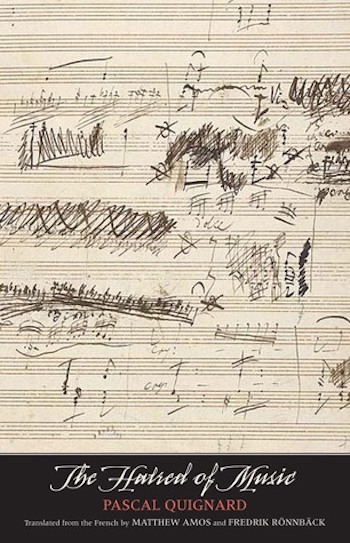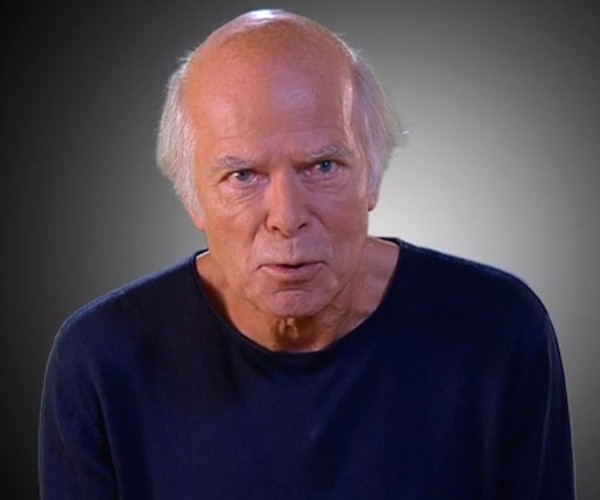Book Review: Is It Possible to Hate Music? And Why?
This invigorating book formulates a caveat: beware of music. And needless to say, after reading these pages bristling with ideas, and insights, one cannot help but listen to music differently.
The Hatred of Music by Pascal Quignard, translated by Matthew Amos and Fredrik Rönnbäck. Yale University Press, 216 pp., $26.
By John Taylor

Pascal Quignard’s The Hatred of Music, published in France some twenty years ago and now finely translated, has—to say the least—a provocative title. What does it imply, especially when this important French writer is also a fine cellist, stems from a family that includes several generations of musicians, and was the founder of the International Festival of Baroque Opera and Theater at Versailles? Wasn’t it Quignard who, through his compelling novel All the World’s Mornings (1991), encouraged us to delve deeper into French baroque music, namely into the magnificent works for cello written by the composers Marin Marais and Monsieur de Sainte-Colombe?
The title of his book is provocative, but the book itself actually offers, more generally, a multifaceted examination of the powerful effects of music on the body and the mind. Bodily effects are especially at stake as the author scrutinizes the strange potency of music, its seeming magic, its otherness, not by appealing to some remote mystical or idealized horizon but rather by considering how music interacts with us on physical, physiological, and social levels.
Yet he also revives the ancient concept of “soul,” though hardly in any facile Christian sense of the term. “Mousikè—says a verse by Hesiod,” he notes for instance, “pours small libations of oblivion on sorrow. Sorrow is to the soul in which memories build up what dregs are to the amphora filled with wine. All we can wish for is that they settle.” Readers of other books by Quignard already know that they will be learning some Greek in The Hatred of Music, as well as some Latin, some Chinese, some Japanese, some Sanskrit…
It is characteristic of him to develop viewpoints that the reader is not expecting. Whence a wealth of quotations, acute perceptions, brief reflections, bald statements, and aphorisms that often point to the nefarious impact of music:
Music alone tears asunder.
The sound of one’s own footsteps; such is the first stratum of silence.
I am like the thief in the ancient Indian tale who plugged his ears when stealing bells.
In the mother’s womb, the heart of the embryo allows the child to endure the noise of the mother’s heart and to transform it into its own rhythm.
Among dozens of similar maxims, which keep the reader questioning the deepest qualities of music and its relationship to human life, there are also instructive mini-narratives:
This tale appears in the Lüshi Chunqiu: the scholar Yu Boya was a prodigious qin player, but it so happened that only a poor lumberjack, Zhong Ziqi, was able to understand the sentiments that his compositions that his compositions and his playing expressed.
He would come join him in the forest. The lumberjack would orient himself by the sound of his friend’s cithara among the branches and the shadows.
When Zhong Ziqi died, Yu Boya broke his qin because there were no longer ears for its song
Quignard has a quarrel to pick with music, at least with some kinds of music. It has been sparked, if not exclusively, by the “incessant, aggressive” music that invades “the commercial streets of city centers, shopping centers, arcades, department stores, bookstores, the lobbies of foreign banks where one goes to withdraw money, even swimming pools, even the beach, private apartments, restaurants, taxis, the metro, airports.”
He expresses his disgust by punning twice on the French word noise, which means, not “noise,” but rather, via the expression chercher noise, indeed “quarrel,” “disturbance,” or “nuisance”:
Music since the Second World War has become an undesirable sound, a noise to use an old word from our language.
Human life is uproarious. We call uproars, or cities, the large conglomerations of cubes where humans accumulate. Noise is their particular scent. Naples, New York, Los Angeles, Tokyo, they are the terrible music of this age.
But sallies against what one might term contemporary “music abuse” by no means constitute the most stimulating aspect of this book. In the latter excerpt, note the synesthesia between sound and smell. This is also typical of the author, who ever observes—hears—how we apprehend the world through primary sense impressions. One of the “treatises” in this book is in fact titled “It So Happens That Ears Have No Eyelids.” He observes that “the ear is the only sense where the eye does not see.” The reader is constantly invited to ponder such propositions, even seek counterexamples. The book encourages one to think twice about received ideas.
Here and there, some technical facts are perhaps extrapolated a bit too far into debatable generalizations. For example, the author states that “the twenty-first [la septième] can be played on strings—on bows—and on winds—at the tip of flutes” and that “on the harpsichord and the piano, it is never heard [. . .] other than by those who silently read works written for keyboard.” He mentions that “the listener believes he hears what is not played.” This is true because an excellent pianist or harpsichordist can play in such a way that this illusion is created. Although Quignard is technically, musicologically, right when he concludes that “only with the eyes do we ‘hear’ the subtonic” and that “we raise a bit for the eye’s ear what keys cannot produce,” the generalization is of limited interest since music, indeed all of the arts, writing included, are based on the use of illusions.
The listener, without the printed notes in front of him, will likely be unaware of the illusion, as Quignard argues. Yet even the listener who is knowledgeable, conscious, and self-conscious enough to grasp what is happening, what he is hearing, that is, even he who hears himself hearing the illusion as it were, is unlikely to dismiss out of hand (and ear) the sequence of “unplayed” notes as unsatisfactory artifice, let alone “hate” it in a manner recalling Plato’s rejection of poetry and the arts in The Republic because of their supposed artifice and falsehood in contrast to the ideal truth sought by philosophers through language—and Quignard is no Platonist. Language can point to this musical trick by using its own tricks to give us the impression that it is describing reality accurately. But reality is multifarious and language necessarily—vastly—simplifies the physiological, psychological, unconscious, conscious, emotional, intellectual and social elements that constitute the experience of hearing. Quignard’s observation is arresting, but he perhaps overemphasizes the role of the eye in his quip about the “eye’s ear.”

Pascal Quignard — His prose is vivid, straightforward, often terse and even abrupt. Photo: France 5
Like many of his other books, such as the recently translated Abysses (2002), The Roving Shadows (2002), and The Silent Crossing (2009), not to mention his still untranslated series of eight Petits traités (Short Treatises, 1981-1990), The Hatred of Music is thus composed of numerous short prose texts which, at first glance, might seem to form a hodgepodge. But this book is no haphazard compilation, no mere commonplace book even in the noblest sense of the term. Thinking of Leopardi, one could call it a Zibaldone, but it is more conscientiously organized than the Italian poet’s great intellectual journal. With one exception, the solemn “On My Death,” the ten treatises of The Hatred of Music consist of a series of thoughtfully interconnected short-prose writings that range in length from a few paragraphs to a single sentence. Each treatise is arranged thematically. One finds such topics as “The Song of the Sirens,” “Louis XI and the Musical Pigs,” “The Tears of Saint Peter,” and, of course, “The Hatred Of Music.”
Quignard is a passionate lettré who writes like a Renaissance humanist. His prose is vivid, straightforward, often terse and even abrupt. It is filled with thoroughly unstuffy scholarly allusions, most of them taken from Greek and Latin literature but also from Chinese, Japanese and Sanskrit classics as well. He draws upon these ancient texts, brings out their vitality and paradoxical timeliness, their unmitigated forcefulness, and “situates his work in a tradition he labels speculative rhetoric,” as his translators explain in their Afterword. Matthew Amos and Fredrik Rönnbäck rightfully show that Quignard’s still untranslated Rhétorique spéculative (1995), published one year before The Hatred of Music, is a key work for understanding his originality in contemporary French literature.

To be sure, Rhétorique speculative, The Hatred of Music and a dozen similar books — one also recalls The Sexual Night (2007) — made up of “treatises” cannot be classified as “fiction,” though there are fictional narratives in them; nor “nonfiction,” though countless facts are brought to the fore; nor “philosophy,” at least in the common discursive sense of the genre. Nourished by so much that is old, Quignard’s prose style and his very conception of writing are new.
It is the title treatise that is the most stunning and the most disturbing. The “music” that is evoked here is that which was played and broadcast in Nazi extermination camps. “Of all the arts,” writes Quignard, “music is the only one to have collaborated in the extermination of Jews organized by the Germans between 1933 and 1945. It was the only form of art to be specifically requested by the administration of the Konzentrationlager.”
Citing testimony given by survivors, especially Primo Levi and the musician Simon Laks, who was the conductor of the “orchestra” at Auschwitz, Quignard shows how music became a form of torture in the camps, “precipitating the end” (Laks) and “leading into the depths” (Levi). “We must tremble when we hear this,” adds Quignard gravely, “those naked bodies entered the chamber to the sound of music.”
The sobering anecdotes and remarks collected by the author induce him to give this particular treatise the awesome title “The Hatred of Music.” As the author specifies, “the expression Hatred of Music is meant to convey to what point music can become an object of hatred to someone who once adored it beyond measure.” This invigorating book thus formulates a caveat: beware of music. And needless to say, after reading these pages bristling with ideas, and insights, one cannot help but listen to music differently.
John Taylor has also written about Pascal Quignard’s books for The Arts Fuse and in his essay “A Passionate Lettré,” which is included in the second volume of his three-volume essay collection Paths to Contemporary French Literature (Transaction Publishers). His translation of José-Flore Tappy’s poems, Sheds: Collected Poems 1983-2013 (Bitter Oleander Press), was a finalist for the 2015 National Translation Award. He has also translated books by Philippe Jaccottet, Jacques Dupin, Pierre-Albert Jourdan, Georges Perros, and Louis Calaferte.
Tagged: Fredrik Rönnbäck, Matthew Amos, Music, Pascal Quignard, The Hatred of Music
